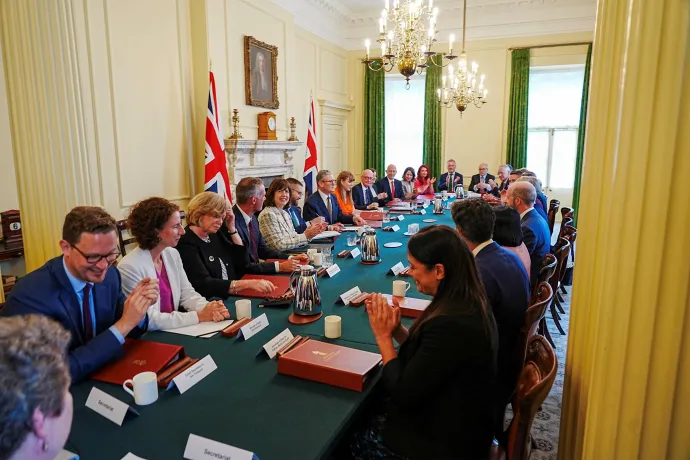Starmer won a huge mandate for change, but economic reality could tie his hands

Despite their single-word campaign slogan, “Change”, British people and EU citizens living in the United Kingdom shouldn't expect sweeping changes overnight from the new Labour government, after Keir Starmer ran a centrist campaign and is now facing the British economic reality. It is shaping up to be a historic government nonetheless.
Labour won a landslide victory in the UK general election on Thursday, while the Conservatives suffered their biggest ever defeat after 14 years in government. The Labour Party, led by Keir Starmer, won almost two-thirds of the seats in the 650-seat House of Commons in a victory comparable to Tony Blair's landslide in 1997.
The landslide Labour achieved on Thursday was expected based on opinion polls and MRP projections published in the run-up to the election.
Professor Roger Mortimore, Director of Political Analysis at Ipsos and Professor of Public Opinion and Political Analysis at King's College London predicted an “unprecedented” election result, “the worst defeat the Conservatives have ever had to an inconceivable degree, and the worst defeat any British government has ever had” in an interview with Telex a week before the election.
But Dr Jack Brown, lecturer at King's College London and the Strand Group, which studies the contemporary history of British governments, says the extent of Labour's victory, however predictable, should not be ignored.
“The scale of this victory is historic. This is the second largest victory in the post-war era for any political party,” Brown told Telex. Only Tony Blair managed to get a bigger majority, with his 1997 landslide victory.
“Starmer got a bigger majority than incredibly iconic and important British prime ministers who changed Britain, like Margaret Thatcher or Clement Attlee, ever did,” the expert added.
Starmer's historic cabinet might only bring restrained changes
However, British voters should not expect drastic changes, according to Brown, despite Labour's campaign slogan being literally “Change”. Labour did not promise radical changes before the election, instead focusing their campaign on how much more competent they would be to govern than the Conservatives, responsible for the political chaos of recent years.
The new Labour government's approach to immigration is not expected to be very different from the Conservatives' for example, even though, one of Keir Starmer's first actions as prime minister was to scrap the divisive Rwanda plan.
The Strand Group expert pointed out that Starmer did not rule out the possibility of using third countries to tackle immigration.

Labour’s commitment to spend serious amounts of money on green investment and green jobs is quite a radical pledge, however, according to Brown, even if Labour had to roll back their original pledge of £28 billion per year to £5 billion per year, due to the worsening economic outlook.
As one of their first actions, the Labour government dropped the Tories' ban on onshore windfarms, signalling their commitment to green energy investment.
Starmer's cabinet might also be considered radical and definitely historic. “This is the most working class cabinet we've had for years,” Brown said.
According to an analysis by the Sutton Trust, only one member of the Labour cabinet is privately educated, while in the last three Conservative governments, two-thirds of ministers attended private schools. The proportion of private school graduates was much higher (32 per cent) in even Tony Blair's and Gordon Brown's Labour cabinets.
The economy and foreign relations expected to cause headaches for Starmer
Despite the huge parliamentary majority, Starmer could still have difficulties governing effectively, mainly because of the worrying state of the British economy.
“The public finances are in a bad state. There's not going to be a huge pot of money overnight. It's a difficult inheritance,” Brown said.
“It's not like 1997, when Tony Blair and New Labour inherited an economy from John Major's Tories that had actually been growing steadily for a few years,” the King's College academic added.
International affairs might also cause some headaches for Starmer. Dealing with Britain's closest ally, the United States, is going to take “an awful lot of time and effort, if Donald Trump wins in November,” Brown said.
Dealing with the war in Gaza will most certainly be another difficult issue. Especially, given the pressure Starmer is facing from the British left. Based on how hostile the election campaign was for their politicians, Brown predicts that Labour is going to be “under an awful lot of pressure” over the issue of the Middle East.
Regarding relations with the European Union and the situation of EU citizens, including Hungarians, living in the UK, the Strand Group expert anticipates a slightly more pro-European atmosphere, even if the UK will not rejoin the EU.
“The entire Labour Cabinet voted to Remain, and whilst Keir Starmer has very clearly said that Britain will not re-enter the EU in his lifetime, he has a huge parliamentary majority and a much more pragmatic approach to Europe and Europeans than his predecessors,” Brown said.
“I don't think we're going to see a transformed relationship with Europe overnight, but at least less hostility towards the EU and migrants from Europe perhaps,” Brown added.
The more than 118 thousand Hungarians and all other EU citizens living in the UK might not expect sweeping changes.
Those currently on the EU settlement scheme can be optimistic following Starmer's victory, but those who had hoped that the incoming Labour government would undo the strict work and family visa rules introduced by the Tories, requiring people to earn £38,700 a year to qualify for skilled worker visa or to bring their families to the UK, might have to put their hopes on hold.
“We can expect changes to the EU settlement scheme I think, but on visas, Labour is committed to reducing immigration, so I’m not sure they will change that,” Professor Anand Menon, a leading expert in British-European relations and Director of the UK in a Changing Europe academic think tank, told Telex.
Brown, however, wouldn't be surprised if the Labour government decided to reevaluate the visa rules.
“Labour have a manifesto commitment to reduce net migration, but they very wisely did not commit to an exact number. I wouldn’t be surprised if Labour revisited the visa rules, and sought to do ‘better deals’ with and for the EU and EU nationals across a range of policy areas, because economic growth is crucial,” the King's College academic said.